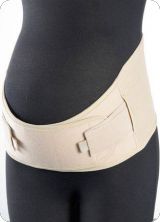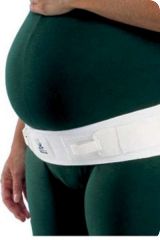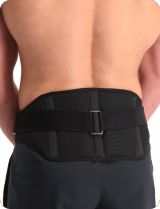Pregnancy Back Pain
Suffering from pregnancy related back pains? If so, then take a look at the products our Medical Team has selected as best for these complaints. Prefer additional information? Feel free to read on, we're more than happy to explain it to you.
Read more »
Which brace is best for you?
For your convenience we use 3 protection levels, that way you will always pick the right brace.
Level 1: Is colored green, and stands for Basic protection.
Level 2: Is colored orange, and stands for Advanced protection.
Level 3: Is colored red, and stands for Highest protection.
Causes
Many pregnant women suffer from back pain during their pregnancy. Not only the weight increase, but also the changing hormone balance during pregnancy cause back problems. The hormone progesterone loosens the connections between the joints during pregnancy, including your tail and hip bones. Normally, there's very little movement, but while your pregnant, there is. This makes it easier for nerves get stuck, which causes pregnancy related back pains. Back pains during pregnancy is very common and can be remedied reasonably well by doing exercises and/or wearing support products like a Back Support.
Suffering from back pain or pelvic instability?
Many pregnant women suffer from back pain after prolonged sitting, standing or walking. The pain often radiates from the lower back to the buttocks, legs and the pubic bone. Back pain is more common and better treatable than pelvic instability. When it comes to pelvic instability, we advise you to wear a Pregnancy Support Belt.
Visiting your General Practitioner
Suffering from persistent back complaints? Then be sure to visit your General Practitioner. Your GP will quickly diagnose whether your back problems are coming from your back or your pelvis. Visit your GP immediately if you have acute and severe pain. Even when you suffer from numbness or tingling in your legs. This may indicate pelvic instability. When it comes to lower back pain that radiates upwards and to the side it is also recommended to visit your GP due to possible cystitis or kidney problems. If you suddenly suffer from severe back pain in your third period of your pregnancy, call the midwife. Certainly if you have not had it before. This may indicate premature labor.
Tips for prevention:
- Stand upright. Give your body additional support by slightly retracting the umbilicus. Tighten the gluteal muscles. Try not to stand too long. Do you work standing? Take a long break halfway through the day, kick the feet up.
- Sit upright when you have a sedentary job. Make sure your legs are positioned in a 90 degree angle. Walk every half hour.
- Wear proper shoes without a high heel.
- Lift from your knees.
- Carry groceries in 2 bags, so you maintain your balance and reduce the risk of back pain.
- Get out of bed carefully. Roll on 1 side, bend your knees and push your upper body up with your arms.
- Take your pain complaints seriously. If your back starts to hurt from certain activities, don't do them.
Pay extra mind to your posture during pregnancy.
Try to maintain your normal posture as much as possible. Especially when the belly becomes bigger, pregnant women tend to push their belly forwards, causing them to contract a hollow back. This is very stressful for your back. Try to teach yourself to pull in your lower abdomen. Of course you can't really retract your belly when it gets thicker, but you can put some tension on the muscles. In addition, it helps to tilt your pelvis back a little. Bring your hipbone back a little and your pubic bone forward a little.








_160_216_80_ffffff_all_10.jpg)







